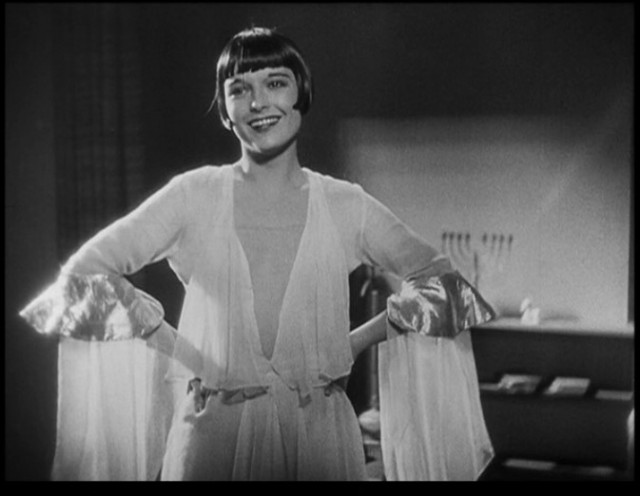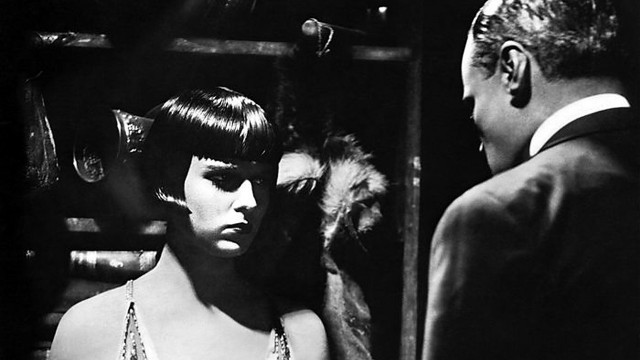CABARET CINEMA: PANDORA’S BOX (DIE BÜCHSE DER PANDORA) (G. W. Pabst, 1929)
Rubin Museum of Art
150 West 17th St. at Seventh Ave.
Friday, February 20, $10, 9:30
212-620-5000
www.rmanyc.org

Upadana, or attachment is one of the three Buddhist poisons, along with aversion and ignorance. The Rubin Museum’s latest Brainwave series, “The Attachment Trap,” featuring film screenings and discussions and intimate talks that pair scientists with performers, explores the notion of the attachment trap, which it describes as “a metaphor for a core Buddhist principle: by holding tightly to external sources of happiness, we prevent ourselves from being truly free.” Running through April, the series includes Jake Gyllenhaal and neuroscientist Moran Cerf talking about “The Actor’s Dream,” writer Kevin Sessums and neuroscientist Carl Hart examining “I Left It on the Mountain,” and game designer Eric Zimmerman and neuroscientist John Krakauer attempting to answer the question “Is Life a Game?” Another key component of the Brainwave festival is the Friday-night film program, this year titled “Fixation,” consisting of movies that deal with attachment, which can also be interpreted as desire or greed. The series began, appropriately enough, with Brian De Palma’s Obsession and continues February 20 with G. W. Pabst’s 1929 silent Weimar classic, Pandora’s Box. Based on plays by Frank Wedekind, Pandora’s Box stars Kansas-born Louise Brooks as Lulu, a good-time girl who loves drinking, dancing, and the attention of men. Lulu, in a trend-setting hair bob and bangs, seemingly just can’t say no, whether it’s as the mistress of married newspaper publisher Dr. Ludwig Schön (Fritz Kortner) or her aging first patron, the father-figure Schigolch (Carl Goetz). Schön’s grown son, Alwa (Francis Lederer), and Countess Augusta Geschwitz (Alice Roberts) also have taken quite a fancy to Lulu. Even after Dr. Schön gets engaged to the well-connected socialite Charlotte Marie Adelaide von Zarnikow (Daisy D’ora), he can’t stay away from Lulu, despite knowing the harm that could bring to his reputation and his future. He helps finance and publicize a variety show that Lulu joins through trapeze artist Rodrigo Quast (Krafft-Raschig), a friend of Schigolch’s. But when Dr. Schön brings his fiancée to see the revue, jealousy takes center stage, and things starting going downhill for Lulu in myriad ways, including murder, blackmail, prison, and sex slavery.
Brooks, a former Ziegfeld dancer who also starred in Pabst’s Diary of a Lost Girl, is riveting as Lulu, a role that almost went to Marlene Dietrich, who ended up playing the lascivious Lola in Josef von Sternberg’s The Blue Angel instead, a film with similar themes. Brooks practically floats through Pandora’s Box, as nearly every character puts her up on a pedestal, desiring her in one way or another — most often, of course, sexually. But she is no mere beautiful angel whose life spirals out of control because of others, nor is she a devious devil out to destroy all in her path; however, she does make her bed and is ultimately forced to lie in it, as most clearly evidenced by her outrageously sly smile upon getting caught in flagrante backstage with Dr. Schön by his fiancée. (The revue scene is a staggering tour de force of acting and directing, with Sigfried Arno as the haggard stage manager, providing necessary comic relief.) The relationship between Dr. Schön and Lulu is reminiscent of the ill-fated romance between Charles Foster Kane (Orson Welles) and Susan Alexander (Dorothy Comingore) in Welles’s Citizen Kane, which might not be mere coincidence, as Kane coscreenwriter Herman Mankiewicz escorted an eighteen-year-old Brooks to see No, No Nanette on Broadway in 1925 and, after he became alcoholically incapacitated, Brooks ghost-wrote his New York Times review, a scene that also worked its way into Kane. More than eighty-five years after its release, Pandora’s Box is still a racy, surprising cautionary tale well ahead of its time, centered by a legendary performance by Brooks, one that is easy to get attached to; Brooks made her last onscreen appearance in the 1938 John Wayne Western Overland Stage Raiders and, after trying her hand at a number of more menial jobs, became a successful film writer, with her works collected in the well-received 1982 book Lulu in Hollywood. The 9:30 Cabaret Cinema screening of Pandora’s Box at the Rubin will be introduced by documentarian Lana Wilson (After Tiller); tickets are $10, but admission to the museum is free starting at 6:00, so get there early to check out such current exhibits as “Witness at a Crossroads: Photographer Marc Riboud in Asia” and “The All-Knowing Buddha: A Secret Guide.”

